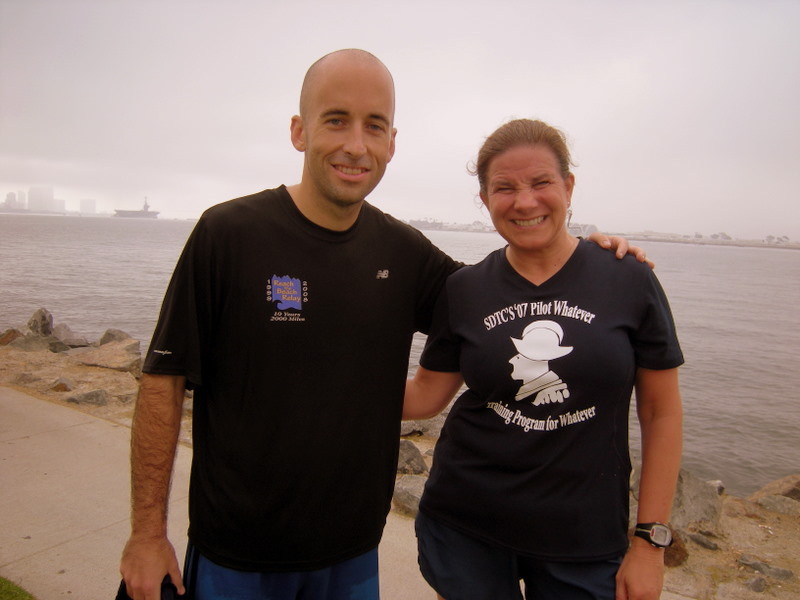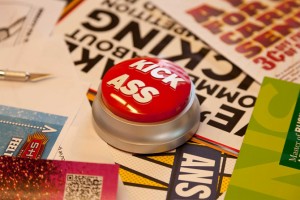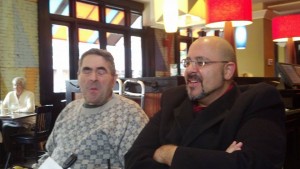The author on why it’s true that mental illness leads to physical sickness.
Mood music:
[spotify:track:24PttQAgkYLdpR4TOgdV4C]
I’ve heard a lot of people argue over whether this person’s or that person’s aches and pains were “all in their head.” You know the types: Never any real underlying disease, but they’re always calling out of work with a headache or some intestinal discomfort.
It’s all in their head, you say?
Well, yeah.
It’s called psychosomatic illness, when mental anguish leads to physical sickness.
 I’ve been there. Migraines. Brutal back pain. A stomach turned inside-out.
I’ve been there. Migraines. Brutal back pain. A stomach turned inside-out.
But it wasn’t always clear that what ailed me was in my head. Childhood illness confused matters. A huge chunk of my digestive track was in flames and spewing blood because of Chron’s Disease. I’m told by my parents that the doctors came close to removing the colon more than once, though I don’t remember that myself; probably because the doctors had that conversation with the parents instead of the patient.
To throw it into remission, they used the maximum dose of a drug called Prednisone, which caused another kind of body blow in the form of migraines. You can read more about that in “The Bad Pill Kept me from the Good Pill,” but the bottom line is that these headaches came daily; always making me sick to my stomach.
Later in life, I developed severe back pain, the kind that would knock me onto the couch and keep me there for weeks.
All legitimate physical problems. But at some point my brain lost the ability to differentiate a real Chron’s flare-up or back spasm to an imagined one.
In the end, though, it doesn’t matter. It may as well have been one of those things. Because when the mind thinks it is, it has a habit of BECOMING real.
I found an article in About.com that describes the problem better than I ever could on my own:
Any illness that has physical symptoms, but has the mind and emotions as its origin is called a psychosomatic illness. Although you may be told that it’s “all in your head”, these illnesses are not imaginary. The aches and pains are very real, but because your doctor is looking for an actual physical cause, they are very tricky to diagnose and treat. The key is to look for a source of stress in the person’s life that the person is not coping with. By treating the underlying stress and depression, it may be possible to heal the physical problems as well.
For me, it was easy to separate the Chron’s episodes from the tricky stuff described above, since the disease was sitting there for the doctors to see. I was always told mental stress could trigger flare-ups and I guess they did, especially when my parents divorced 30 years ago and a lot of stress over custody ensued. I’m fairly sure the after-effects of my brother’s death set off the last real flare-up in 1986.
But the migraines and back problems seeped seamlessly into the things that were going wrong with me mentally.
Anxiety attacks felt essentially the same as a heart attack, complete with the pain shooting from the chest to the neck and down the arms. Migraines followed. Work stress often sparked migraines and back pain.
While it was difficult to separate other legitimate physical problems from those stemming from mental distress, I can tell you that dealing with my underlying OCD, depression and addiction made a lot of ailments go away.
I’m not sure I can credit it with ending the back problems. Though mental illness most likely enhanced the back pain, that problem was eventually diagnosed as three out-of-whack vertebrae the chiropractor knocks back into alignment every other week. No more imprisonment on the couch.
But these things have gone away — and have not returned — since I got a handle on the OCD and related binge-eating disorder:
–Puking up stomach acid in the middle of the night
–Numbing of the feet
–A strange poked-in-the-eye sensation that would hit me early mornings and leave me with blurred vision for a day or more.
–A dull ache in the left hand, which often got worse as my mind spun out of control with thoughts that it MIGHT be a heart-attack.
–Fatigue that would cause all my joints to ache unless I were to lie down and go to sleep.
–Heart palpatations.
All disappeared once I started to attack the core problem.
The ultimate take-away from all this is that something in your head can cause real, physical pain.
And when you deal with what’s in your head, the pain in the rest of your body can be eradicated.






